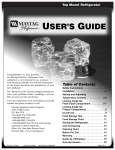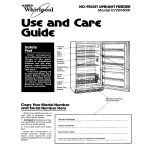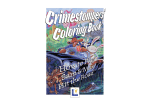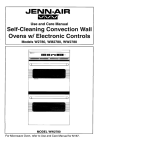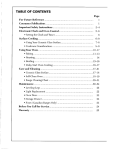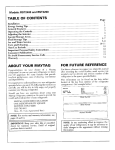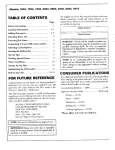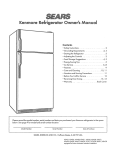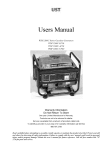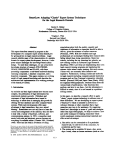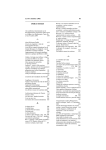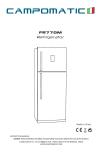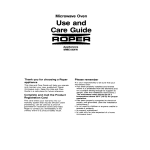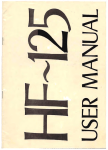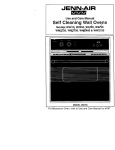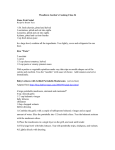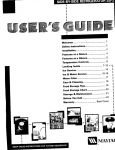Download Whirlpool Refrigerator Maytag RSD2000
Transcript
Model: RSD2400, RSD2200, RSD2000
TABLE OF CONTENTS
ABOUT
YOUR MAYTAG
Page
Installation
.................................................
General
Features
......................................
1
2
Operating
the Controls
...........................
Adjusting
the Interior ..............................
Special Storage Areas ...............................
Food Storage Tips .....................................
3
4-5
56
6-9
Ice Service ..................................................
Care and Cleaning
...................................
Non-Use Periods .......................................
Consumer
Publieations
............................
10
11-12
13
13
To Avoid
Unnecessary
IMPORTANT
Serviee
Calls .....
14
Congratulations on your choice ofa Maytag refrigerator!
As yon use your new refrigerator we know you will
appreciate ti_e many, features that provide excellent
performance,
ease of cleaning, convenience
and
dependability.
It is important to understand how )our new refrigerator
operates before you use it. On the following pages you
will find a wealth of information regarding all aspects of
),our refrigerator. By following the instructions carefully,
you will be able to fully" enjoy and properly maintain
your Maytag refrigerator.
Should you have any questions about using your Ma_ag
refrigerator, contact us. Be sure to provide the model
and serial number of your refrigerator.
PERSONAL
MAYTAG CONSUMER EDUCATION
ONE DEPENDABILITY SQUARE
NEWTON, IOWA 50208
SAFETY INSTRUCTIONS
1. To prevent possibility of hazard due to electrical
sbock, never plug the refrigerator into a receptacle
which has not been grounded adequately and in
accordance
with the local and national
(515) 791-8911
(Mon. Fri., 8 am-5 pm Central Time)
electrical
codes. See the grounding instructions on page 1.
2. Unplug the refrigerator
before
cleaning
the
or replacing
light bulb. door openings. If
3. condenser
In ease of power
failure, a minimize
the power failure is of a long duration, protect the
food by placing blocks of dry ice on top of the
packages or check with a local frozen foods locker
plant about temporary storage. Frozen foods which
bave thawed completely should not be reffozen,
4. Any electrical service cord that becomes frayed or
damaged
should be ilmnediately
repaired
or
replaced. Never unplug your applianee by' pulling on
the power cord.
5, Your refrigerator should not be operated in the
presenee of explosive fumes.
6. Remove tlre doors from any' out-of-use refrigerator
to prevent child entrapment and suftbcatiou.
7. Children should not climb, }rang or stand on the
shelves of this refrigerator.
NOTE:
For service information, see pagel4.
[ IMPOBTAdV_ Keep your sales slip or cancelled
eheck forwarrantyserviee.
Proof of original date of
purchase is needed.
I,
FOR
FUTURE
REFERENCE
For future reference we suggest you retain this manual
after recording the model nmnber, serial number (six
numbers and two letters) and revision number of this
refrigerator in the spaces provided belo_
This information can be found on the data sticker
located at the top front interior of the refrigerator
compartment. (See example below.)
c
MAY'TAG
_gD,,L,_.
REVHO
/
NEWTON
usa
IA
5o2o8
ModelNumber
MAXA_p_
_o'_,_d'_'_
...................
SerialNumber
s
°'
Es
c(_
Revision
Number
INSTALLATION
Remove and discard tile cantilever shelf packing clips
located just above each shelf where it hooks onto the
frame. To remove the plastic clips, wiggle the clips
sideways and pull straight out.
Locating
TURNCLOCKWISE
TO
RAISE
CABINET
CORNER
Your Refrigerator
1. Allow a free flow"of air through the front base grille.
2. Your model should not be installed where the room
temperature will go below 55 degrees F., because it
will not run frequently enough to maintain proper
temperature in the freezer.
3. For ease of installation, you should leave a space of
about i/2 inch between the refrigerator and adjacent
walls or cabinets. If the refrigerator is placed with the
hinge side against a wall, you may want to leave
additional space so the door can be opened wider.
(Refer to the installation
instructions
for more
detail.)
Important
Leveling
Information
the refrigerator sits firmly on the floor aud is level.
the
front
COUNTERCLOCKWISE
TO
LOWER CABINET
CORNER
3. It
is not necessary
to lock theturn
refrigerator
in place.
Howexer,
if that is desirable,
one or both
of the
locking
feet clocl_dse.
f?contwheels.
They arc located near the
If the floor is not level and it is necessary to raise the
rear of the cabinet, we suggest rolling the rear wheels
onto a piece of pl}_vood or other shim n/aterial.
4. To replace, center the clips iu file cut out areas and
Your refrigerator is equipped with front and back rollers
so it can be moved away from the wall fbr cleaning. The
front rollers are adjustable and should be positioned so
To adjust
TURN
rollers:
1. Remove
pull out. the base grille by grasping the ends, lift and
push in until the base grille snaps into place.
Connecting
] W_g/NG}
'_tlis appliance is designed to operate
I on a nominal 1:15"_01t, 15 amp, 60 eycte _ne. There
/ should' be ase
P arate, g?oundedi_ircuit, seMng this
/ apptia6ce0nly. D6 n6t use a3aextension cord.
This appliance
IO1
.
-'_
2. To level the refrigerator, use a screwdriver and turn
roller adjusting screws clocGvise to raise the cabinet
or couuterclockavise to lower the cabinet.
the Appliance
is equipped
with a three-pronged
electrical shock hazards. It nmst be plugged into a
grounding receptacle. Where a standard two-prong wall
receptacle
is encountered,
it is against
the personal
grounding p]ng
tbr vour protection
possible
responsibility and obligation of the customer to have it
replaced with a properly grounded three-prong wail
receptacle. Do not under any cireulnstaoces, cut or
remove the third (ground) prong from the power cord.
Do not use an adapter plug.
PAGE 1
GENERAL FEATURES
Ice Bin
Twist
Ice Cube
Trays
)r Lights
Refrigerator
Temperature
Control
Freezer
Temperature
Control
Sure-Lock
Shelves
III
Compartment
Ii
Freezer
Light
;;;
--
ustable
Door Bins
Rack
Cradle
Adjustable
Freezer
J
Drawer
Shelf
Bottle
Retainer
Adjustable
Baskets
Crispers
Door Bins
.......
J
Freezer
Vari
Keeper
/
]
Basket
Adjustable
Front Rollers
Base Grille
Features may vary according to model.
PAGE 2
OPERATING
THE CONTROLS
Your new refrigerator has two controls: one for the refrigerator compartment and one for the fieczer compartment.
These controls are located at the top, back wall of the refrigerator compartment.
FREEZER
I
"
REFRIGERATOR
D.INITIALSET'ING
6.1Nr£1ALSETTING
G COLDEST8E]q'ING
Initial
Setting
114_OLDESTSETTING
of Controls
Refrigerator
Freezer
Control: This control has settings from A
(warmest) to G (coldest). Initially set this control to
D.
the refrigerator
control to the next lower number. For example, turn
the control front 6 to 5.
Warm
Refrigerator
Control: This control has settings from
1 (warmest) to 11 (coldest). Initially set this control to
6. The refrigerator may run for several hours when you
first start it. This is normal.
too cold--Turn
Cabinet
Surfaces
Some portions of the cabinet may he warm to the
touch. This is a normal fnnction of the refrigerator
which helps prevent moisture from condensing on the
cabinet. This condition _411be more noticeable when
you first start your refrigerator, during hot weather and
after excessive or lengthy door openings.
Let the refrigerator
run at least 8 to 12 hours
before adding food. A day or so after adding food, you
may decide one or both compartments should be colder
or warmer. If so, adjust the control(s) as instructed
Energy
below.
Adjusting
'2. Level the refrigerator and do not block ventilation
around the front grille.
the
Temperature
Controls
Except when starting the refrigerator, do not change
either control more than one number or letter at
a time. Allow 24 hours for the temperature to stabilize
before resetting. Changing either control will have
some effect on the temperature
of the other
compartment
Freezer too warm--Turn
the freezer control to
the succeeding letter. For example, turn the control
from D to E.
Freezer too cold--Turn the freezer control to the
preceding letter. For example, turn the control front
D to C.
Refrigerator
too warm--Turn
the refrigerator
control to the next higher number. For example,
turn the control from 6 to 7.
Saving
1. Locate the refrigerator away ti'oin heat producing
appliances snch as the range or dishwasher, heat
vents and direct sunlight.
3. Keep the fi'eezer full to near capacity so less cold air
will escape dnring door openings. When less than
two-thirds full, place milk cartons half fidl of water in
the freezer.
4. Let hot dishes cooI slightly before putting into the
refrigerator or freezer.
5. Cover liquids.
6. Clean the refrigerator condenser coils once a year.
more often if you have pets (see page 12).
7. Wipe moisture from the outside of"containers before
placing them into the ref?dgerator.
8. Avoid opening the doors too often.
PAGE 3
ADJUSTING
THE INTERIOR
Sure-Lock
Shelves
Refrigerator
Interior
: 6r adjugthblel
I_OTE.
ThebottombinisK_edandnotremovable
The refrigerator shelves are adjustable, alloxx_ngyou to
To remove
arrange the sheMng to fit your family's food storage
needs.
attempt
to adjust a shelf that is
loaded Never
with food.
Lift the bin straight up. Tip out the bottom of the bin
and pull out the bin.
To remove
To replace
the refrigerator
shelf:
1. Grasp the shelf at the front _*_thone hand and push
up under the shelf back with the other hand.
2. Lift the shelf straight out.
the door bins:
Insert the top hooks first. Then push in and down.
Keepers
To replace the refrigerator
shelf:
1. Keeping the shelf horizontal, guide the three support
tabs into the slots in the shelf supports at the rear of
the cabinet,
2. Lower the shelf until the tabs lock into position,
Make sure the shelf is securely locked into position
betbre loading it with food.
To slide out the shelves (select models):
I
the door bins:
and Tall
Bottle
Retainer
Some refrigerator door bins have "keepers" to secure
bottles and containers. The keepers will help prevent
items from tipping or falling when the door is opened
and shut. On adjustable door bins, lift the keeper
slightly to slide from side to side. Oi1 fixed door bins,
simply slide the keeper from side to side.
One keeper is specially designed to prevent tall bottles
from tipping forward (select models).
Grasp the shelf and pull forward. Push in shelf to return
it to the original position.
Meat/Cheese
Drawer Shelf
The shelf that holds the Meat/Cheese
drawer can be
placed in one of three positions. When adjusting this
shelf, remove the Meat/Cheese drawer and look at the
back wall of"the drawer frame. It is necessary for the
air inlet tube at the back of the refrigerator
to
line up at the top, middle or bottom of the air
slots in the back of the Meat/Cheese
drawer
frame
for the temperature
control
to work
properly'. Set the temperature control to the coldest
position when positioning the Meat/Cheese drawer.
Once the shelf has been adjusted, replace the drawer
and set the control to the desired setting (see page 5).
If not positioned
below the drawer
correctly,
items
may freeze,
on the
shelf
Gallon Door Bins
The pick-off refiigerator door bins are adjustable and
can be easily removed. They are a complete bin, so
items may be carried in the bin without falling out.
PAGE4
Freezer
Shelves
The top freezer shelf can be removed to accommodate
large size packages and for cleaning. Other shelves
(select models) can also be removed or adjusted up or
down.
To remove the shelves:
1. Lift up on the shelf and push to the right.
'2. Tilt the left side of the shelf up and remove.
SPECIAL STORAGE AREAS
To replace
Crispers
the shelves:
1. Tilt the shelf and insert the right rod ends into the
The Vari Crisper
2. Lower the left side of the shelf and insert into the
oblong holes in the left side of the freezer wall. Make
vegetables.
sure the
shelf is secure before loading.
c, upper
", portion of the oblong holes in the freezer wall.
Move theto slide
"FRUITS"
foreither
a low moisture
Setting
the
Vari to
Crisper
Control
crisper
beandcontrol
controlled
tbr storing
fi'uits or
emdromnent
to "VEGETABLES"
for high moisture,
i_
To remove tile Crisper Drawers:
_
1. Pull out to the stop position.
_,
',
allows the amount of moisture in the
_".
I] _
Freezer
Baskets
(select
models)
Your refrigerator
has three freezer baskets--one
shallow Easy, Glide, one Pizza and one deep Easy Glide.
2. Tilt up the drawer front and pull out.
Each glides out for more convenient
1. Align the drawer rollers in the tracks.
J'_"
right side
frozen
food.
for The
easyPizza
storage
basket
of frozen
is designed
pizzas,with
All baskets
a lower
can be removed for cleaning. In addition, the shallow
2. Lift the drawer front and push in.
To remove the Crisper Shelf:
_
Easy Glide and Pizza baskets can be adjusted up or
down to accommodate various sized packages.
To remove the baskets:
1. Remove the crisper drawers.
access to the
1. Pull the basket toward you until it stops. Lift the
front of the basket and pull until it stops again.
2. Lift the basket up and over the front tabs.
To replace
the baskets:
To replace
the Crisper
_
_,
2. Remove the glass insert. Reach in from the
underside and tilt up. Carefully remove the insert.
3. Lift the front of the crisper shelf and pull out. It may
be necessary to remove the lower ref_'igerator
shelves so the crisper shelf can be tilted for removal.
Reverse the above procedure.
To replace
To adjust tim shallow Easy Glide and Pizza baskets:
Reverse the procedure
1. Remove the basket as directed previousl_
MeatCheese
'2. Place one of the bottom two hea, T wires in the track
and replace the basket.
Drawers:
the Crisper
Shelf:
for removing the crisper shelf.
Drawer
Fresh
cheese
need to be
stored meat,
in theluncheon
coldest meat
part and
of the
refrigerator
to
maximize storage time. The MeaUCheese
drawer
provides these colder temperatures because air from
the freezer is directed into the drawer.
Setting
the
Temperature
I
I
Control
To regulate the amount of cold air entering the
Meat/Cheese
drawer, move the temperature
slide
control. Set the slide control to the "DELI/CHEESE"
(right) position for storage of luncheon meat and
cheese. Set the slide eontrol to the "FRESH MEAT"
(left) position to pro_dde the lowest temperature
fresh meat storage.
for
PAGE 5
t
'
'
,'
NOTE:
If
tile _ae|f ho_
the
st_elf_lr"the_aw_'_'#_._ef'_'_:o_q"g
e_]'."y-_-_.., -." "_ _,_-_ -
_Me_ffC_6ese t
*- _
ont/owto Doatiofime snell.
:
To remove
.....
the Meat/Cheese
_
"
....
<
l--
•
4
]
|
;,
_'
Covered
Dairy
Compartment
j
The butter dish
the either
covered
Use isthislocated
area to instore
butterdairy
or
e°mr'a_mem'
marc_arlne°r°_herdairvnr°ducts'T'_use,
r_isethec°ver'_,--_- _-_r
_
-_
-
Drawer:
1. Pull out to the stop position.
Egg Cradle
2. Tilt up the drawer front and pull ont.
To replace the Meal/Cheese
Drawer:
The egg cradle can be placed on a refrigerator shelf or
stored in a door bin. It holds a "dozen-plus" eggs.
1. Align the drawer rollers in the tracks.
2. Lift the drawer fi'ont and push in.
Wine Rack
Corked _4nes should be stored in a horizontal position
to keep the c_rk moist. This prevents air from getting
i_to the wine and spoiling it, The wine rack allows
proper storage without taking up valuable shelf space. It
may also be nsed for sto_J_g one liter containers of soda.
To use the _4,e rack, fit it along eltber side of any
refrigerator shelf, engage its rear notch to the shelf
back corner and lay' the bottle on the rack,
FOOD
STORAGE
TIPS
Fresh Food Storage
The fresh food compartment of a refrigerator should be
kept between 34°F and 40°F with an optimum
temperature of 37°F. To check the temperature, place
an appliance thermometer in a glass of water and place
in the center of the refrigerator. Check after 24 hours.
If the temperature is above 40°F adjust the controls as
explained on page 3.
Avoid
overcrowding
the
refrigerator
shelves,
Overcrowding reduces the circulation of air around the
food and results in uneven cooling. Leave breathing
space around food containers for best cooling results.
The storage reqnirements
for different _bods vary
depending on the temperature and moisture needed.
Refer to the Food Storage Chart on pages 8-9 for
approximate
storage times. To maintain the best
possible quality, keep the foliowing considerations
in mind:
PAGE 6
Meat and Cheese
• To maximize storage time store these items in the
Meat/Cheese
drawer.
Refer to page
5 for
temperature settings,
filll it will be helpful to fill milk cartons half fnll of
water and place them in the freezer.
Refer to the Food Storage Chart on pages 8-9 for
approximate
storage times. For the best results
Fruits and Vegetables
when freezing foods, follow these guidelines:
• Storage in the crisper drawers traps moisture to help
keep fruits and vegetables fresh. The Vari Crisper
allows the moisture level to be adjusted depending on
Packaging
Foods for Freezing
• When freezing fruits and vegetables select fresh, topquality products.
what is stored in the crisper. Generall_ fruits need
low moisture and vegetables need high moisture.
Refer to page 5 for setting the control,
• Use a freezer wrap that is air-, moisture- and vapor-
• Fruit and vegetable quaJity affects the length of
storage. Quality can vmTyfrom item to item varietd: to
variety and season to season. For example, a rainy
growing season can cause lettuce to be brow_l when
purchased or brown more quickly. Sort fruits and
vegetables before storage and use bruised or soft
items first. Discard those showing signs of decay.
• When storing vegetables, the crispers will perform
better if they are at least two-thirds full. If they are less
than two-thirds full, always store vegetables in plastic
bags oi" airtight contaiuecs to reduce moisture loss.
proof. Some good choices are heaxT-duty aluminum
foil, freezer plastic wrap, polyethylene-coated freezer
paper, freezer bags or airtight containers. Force as
much air out of the packages as possible and be sure
they are tightly sealed. Trapped air ean cause the food
to dD, out, change color and develop an off-flavor
(freezer burn).
• Fresh meats and poult D can be left in the store
wrapping when freezing for less than gvo weeks. For
longer storage, overwrap with a suitable freezer wrap.
Do not refreeze meat that has completely thawed.
Loading
the Freezer
• Always wrap odorous foods such as onions and
cabbage so the odor does not transfer to other foods,
• While vegetables need a certain amount of moisture
• Avoid adding too nmch warm food to the freezer at
one time. This overloads the freezer, slows the rate of
freezing and can raise the temperature of already
frozen foods.
to remain fresh, too much moisture can shorten
storage times (especially lettuce). Be sure the
vegetables arewell drained before storing. It may also
be helpfnl to place a layer of paper towels in the
bottom of the bag to absorb anv excess moisture,
• Place the packages in the coldest part of the freezer
first (against the walls or bottom of the compartment)
to insure the food freezes as quickly as possible.
Leave a little space between the packages so cold air
ean eirculate.
Dairy Food
• Store butter
and margarine
in the
Compartment found in the refrigerator door.
Dairy
• Most dai D' foods such as rnilk, cream, sour cream and
cottage cheese have freshness dates on their cartons
for appropriate length of storage. Store these foods in
the original carton and refrigerate immediately after
purchasing and each use, Close carton lids tightly to
keep out air and odors.
• Occasionally mold _ill develop on the surface of hard
cheeses (Swiss, Cheddar, Parmesan). The moldy'
areas can be trimmed away and the remaining cheese
will still be flavorful and safe to eat.
Frozen Food Storage
• Avoid storing hard-to-freeze tbods such as ice cream
and orange juice on the freezer door sheh,es. These
foods are best stored in the freezer interior where the
temperature varies less with door openings.
Foods That Don't
Freeze Well
• Some foods cannot be frozen sueeessfill b, because
the freezing causes them to deteriorate.
These
include:
potatoes (unless mashed)
erealn fillings
cooked eggwhites
sour cream
salad greens
The freezer compartment of a refrigerator should be
kept at 0°F or lower. To check the freezer, place an
luneheon meat
soft cheeses {cream, cottage, processed}
m_onnaise
milk and cream
appliance thermometer bern,ten the frozen packages
and check after 24 hours. A freezer operates more
efficiently when it is at least two-thirds full. If not this
gelatin salads
bananas
citrus fruits
PAGE 7
Food Storage
Chart
The follow,ring chart shows approximate storage times* for valious refrigerated
and frozen
can vary depending on the type of packaging used and the storage temperatures.
foods. These storage
Butter
1-2 weeks
6-9 months
Store only enough for immediate use in the
Dairy Compartment. Wrap tightly or cover.
Milk & cream
1 week
Not recommended
Cheek the carton dating. Close tightly. Don't
return unused portions to original eontainer.
Don't freeze cream unless whipped.
Cream cheese, cheese
spread & cheese food
1-2 weeks
Not recommended
Wrap tightly. Some cheese foods can be
stored for longer periods.
Cottage cheese
5-7 days
N0t recommended
Store in original carton. Check the carton
dating.
Hard cheese (Swiss,
Cheddar & Parmesan)
1-2 months
May become crumbly
Wrap tightly. Cut off mold if it develops on
the surface.
Sour cream
10 days
Not recommended
Store in the original carton. Check the carton
dating.
Eggs in the shell
i week
NOt recommended
Refrigerate
Leftover yolks or
whites
small ends down.
days
9-12 months
For each cup of yolks to be frozen, add i tsp.
sugar for use in sweet, or 1 tsp. salt for nonsweet dishes.
Apples
1 month
6-12 months
May also store unripe or hard apples at 6070°E
Bananas, pears &
avocados
3-5 days
6-12 months
Ripen at room temperature before
refrigerating Bananas and avocados will
darken when refrigerated.
Berries & cherries
2-3 days
6-12 months
Store covered or in the Crispers to prevent
moisture loss.
Citrus fruits
1-2 weeks
Not recommended
May also store at 60-70°F. If refrigerated.
store uncovered.
Grapes
3-5 days
6-12 months
Store covered or in the Crispers to prevent
moisture loss.
Peaches. nectarines.
plnms & apricots
3-5 days
6-12 m0riths
Ripen at room temperature
refrigerating.
Pineapples, cut
2=3_
6;-12 umn_
_vill _ot_ _riDen-.-afterpurchase.. Use _quickly to
a_a _e_
before
aeteno_at_o_.
Continued
PAGE8
on next page
times
Food
Storage
Chart
Refrigerator
Time
Foods
FRESH
(continued)
Freezer
Time
Storage
Since vegetables
remain
fresh
longest
in a moist env@onment,
they
Crisper
with the control
im the "Vegetables"
setting,
If the crispers
vegetables
in phtstie
bags or plastic
omtaincrs
to prevent
moisture
VEGETABLES
Tips
should
be stor_'d
are nl)t two-lhirds
loss.
in the Vari
hdl, store
Asparagus
2-3 days
8-12 months
Don't wash before refrigerating.
crisper.
Store in the
Brussels sprouts &
broccoli
3-5 clays
8-12 months
Wrap odorous foods & refrigerate in the crisper.
Cabbage & celery
1-2 weeks
Not recommended
Wrap odorous foods & refrigerate in the crisper.
Cauliflower & snap
beans
1 week
8-12 months
Wrap odorous foods & refrigerate in the crisper.
Carrots, parsnips,
beets, radishes &
2 weeks
8-12 mouths
Remove tops. Wrap Odorous foods and
refrigerate in the crisper.
3-5 days
8-12 months
Leave in pods & refrigerate.
Lettuce & other salad
greens
1 week
Not recommended
Wash. Drain well. Refrigerate in the crisper.
Onions, green
3-5 days
8-12 months
Wrap odorous foods & refrigerate
8-12 months
Wrap odorous foods & refrigerate in crisper.
Can be kept in original packaging for
refrigeration. Place in the Meat/Cheese
drawer _Mth control on the "FRESH MEAT"
setting. When freezing longer than 2 weeks,
overwrap with suitable freezer wrap.
turnips
Green peas & lima
beans
Peppers
FRESH
POULTRY
1 week
& FISH
Chicken
Turkey, duck & goose
1-2 day's
1-2 days
6-12 months
4-6 months
Fish
1-2 day's
1-2 months
Beef, ground
Beef, roast & steak
1-2 days
3-5 clays
4-6 months
9-12 months
Pork
3-5 days
6-9 months
Veal
3-5 days
4-6 months
Sausage, ground
1-2 day's
1-3 months
Lamb
3-5 days
9-12 months
Bacon
7 days
1 month
Frankfurters
7 days
2 weeks
Ham, whole
half
slices
7 days
5 days
3 days
-
1-3 months
1-3 months
1-2 months
Luncheon
3-5 da_
' recommended
'
Not
FRESH
MEATS
Can be kept in original packaging for
refrigeration. Place in the/V!eat/Cheese
drawer with control on the 'FRESH MEAT"
setting. When freezing longer than 2 weeks,
overwrap with suitable freezer wrap.
Processed meats should be tightly wrapped
and stored in the Meat/Cheese drawer with
the control on the "DELUCHEESE"
setting.
,,
meat
Sausage, smoked
°Srmrces:
in crisper,
Urtite_l States Department
7 days
ofA_ riculture;
'
4
J
g
_uno pened ; Vacuum: p acked 1 reich eon me &
maybe kept up tO 2 weeksl
Not recommended
Food Marketing
institute;
CooperatNe
Extc'nsion Service, Iowa State' Ullixersity
PAGE 9
ICE SERVICE
Twist
ice Cube Trays
Your refrigerator
comes equipped
• After your refrigerator
with twist ice cube
trays and an lee storage bin. To release the frozen cubes
hold the trays upside down over the ice storage bin and
t_xqst both ends.
has been hooked up to the
water suppl_; move the wire lever arm into the down
position. This will start its operation. The ice maker
will fill with water when the freezer reaches the
proper
temperature.
With
a newly installed
refrigerator this could take up to 24 hours.
• Discard all the cubes from the first two or three
batches made. These initial batches of"ice cubes may
be irregular in shape and discolored.
• When the ice cubes are ejected it is normal for several
cubes to be joined together at the ends. They can
easily-be broken apart, The ice maker will continue to
make ice until the supply of ice cubes raises the wire
lever arm, shutting the ice maker off.
• To manually stop the operation of the ice maker, move
the wire lever arm into the up position.
• Certain sounds may accompany the various operating
cycles of the ice maker:
Automatic
Ice Maker
(optional)
Your refrigerator has been designed so an automatic ice
maker can be easily and quie!dy installed. If your
refrigerator is equipped with an automatic ice maker,
there are some things you should knmv about its
operation:
--buzzing
of the water valve
--running
of the water as the tray fills
--rattling
of ice cubes faJling into an empty ice bin
• If the ice is not used frequently, the ice cubes will
become cloudy; shrink, stick _ogether and taste stale.
Emp)- the ice storage bin periodically and wash it in
lukewarm water. Be sure to dry the bin before
replacing it.
• To remove the ice bin, pull it forward, away from the
ice maker. To avoid the ice maker dumping ice while
the bin is removed, turn the ice maker off by Jilting
the wire lever.
• To replace the ice bin, reverse the above procedure.
Turn the ice maker on by lowering the wire arm.
• Beverage and foods should not be placed in the ice
storage bin for quiek chilling. These items can block
the wire lever arm, causing the ice maker to
malfunction.
PAGE 10
CARE AND
CLEANING
Refer to the chart on the next page when cleaning the
Refrigerator
refrigerator.
Two upper lights are located behind the full width light
shield at the top back of the refrigerator compartment.
A lower refrigerator
light is located behind the
Meat/Cheese drawer on select models.
'
CAUTION: Disconnect the power
cleaning.
Also, do not touch
cord before
reffigera{ed
surfaees with wet or damp hands. Damp 0bjeets
stick to cold metal surfaces. Before cleaning, the
freezer, allow it to warm up. Allow glass shelves tO
warm up before immersing in warm w_iter.
Cleaning
Under
the
To replace
Refrigerator
the Defrost
3. Lift up and remove
bulbs:
the shield.
4. Unscrew
the bulb and replace
appliance bulb.
with
a 40 watt
5. Replace the light shield by hooking the top of the
shield over the plastic pins• Secure the bottom of the
shield by' pushing in on the middle edges of the
shield at both ends.
Pan
The defrost water drains into a shallow pan beneath the
cabinet and evaporates. This pan should be cleaned
periodically with warm sudsy water.
To remove
refrigerator
1. Unplug the refrigerator.
"2.Remove the light shield by grasping the bottom of the
shield at each end and pulling forward to remove.
Your refrigerator can be rolled out for cleaning the floor
underneath. Raise the locking feet if engaged (see page
1). Pull the refrigerator straight out from the wall.
Cleaning
the upper
To replace the lower refrigerator
bulb:
1. Unplug the refrigerator.
2. Remove the Meat/Cheese drawer and shelf•
the defrost pan:
1. Remove the base grille (see page 1).
9. Lift the pan up and pull out.
3. Using two hands, spread the top and bottom of the
light shield vertically away from each other and pull
to the front to remove.
To replace
4. Unscrew
the defrost
pan:
1. Position the side flanges to fit over the slide rails and
press down on the center of the pan to snap in place.
and replace
with
a 40 watt
showease bulb.
5. Using two hands, spread the top and bottom of the
light shield and push it into place, engaging the tabs
into the slots.
2. Replace the base grille,
:
the bulb
I
6. Replace the Meat/Cheese
Freezer
drawer and shelf.
The freezer light is located in the upper portion of the
freezer compartment.
To replace the freezer bulb:
Replacing
the Interior
1. Unplug the refrigerator.
9_.Remove the ice bin (see page 10) and the freezer
shelf (see page 5).
3. Unhook the tabs on the top of the light shield by
pressing in with your thumb on the center top of the
light shield. Pivot the shield down.
Lights
CAUTION: Disconnect the power cord before
] replacing light bulb, S):_'We_r giOVeS_ _oteC_n
against possible bf6keh gl_.
o , o,
_
:
.. :.
:: .....
I
]
4. Unscrew the bulb when cool and replace it with a
standard 40 watt appliance bulb.
5. Pivot the shield up into place snapping the tabs into
the slots. Replace the freezer shelf and ice bin.
PAGE 11
.._,
@
Refrigerator
Cleaning
Chart
Cleaning
Agents*
Many different cleaning agents are recommended for
the various parts of Maytag refrigerators. The following
brand names may help you make an appropriate
selection:
DO NOT USE abrasive cleansing powders such as
Comet or Zud, soap-filled scouring pads like S.O.S. or
Brillo except when indicated. See pages 4-6 on how
to remove and replace speei_qe parts.
1. Mild abrasive cleaners such as Bon Ami, Soft Scrub,
Bar Keepers Friend, Cameo.
2. Mild liquid sprays such as Fantastik, Formula 409.
3. Glass cleaner such as Windex, Glass Plus.
4. Appliance wax such as Jubilee.
Soap and water
Milclliquid sprays
Vacuum cleaner
attachment
Remove the base grille by _rasping the ends, lilt and pull
out.To replace, center the _ips in the cut-out areas and push
in until ttie base grille snaps fnto place.
-
Vacuum cleaner
attachment
The area arolmd the condenser should be cleaned once a year
for efficient operation, clean more often if there are pets in
the home. Remove the base grille and vacuum around the
condenser.
Soap and water
See page 11 on how to remove and replace.
Soap and water
Milcl liquid sprays
Soap and water
Mila liquid sprays
Appliance wax
Wax at least once a year. Do not wax plastic or vinyl parts.
Glass cleaners
Soft, clean, lint-free
cloth (cotton diaper
or cheesecloth)
The follm_4ngglass cleaners clean these panels best without
streaking: Gl-as-sPlus, S.O.S. Glass Cleaner, The Works Glass
Cleaner and Glassmates Wipes% Do not use paper towels or
soiled cloths because panels-can scratch easily. -
Baking soda and water
Soap and water
Use 1-'2tablespoons baking soda per quart of water. Be sure to
wring out excess water from sponge or cloth when cleaning
aroufld controls, lights, or electrical parts.
Soap and water
Glass cleaner
Mild liquid sprays
Mild abrasive cleaners
Allow ghe glass to warm up to room temperature
immersing in warm water. Never use hot water.
Soap and water
BaEng soda and water
See above for baking soda solution,
DO NOT use abrasive cleaners, concentrated detergents,
bleaches, cleaning waxes, solvents or polish cleaners to clean
the refrigerator interio_
Soap and water
*Brandnames of cleaning agents are trademarks of the respective manufacturers.
PAGE 12
before
Vacations
NON-USE
Moving
PERIODS
If you will be gone for a month or less, leave the
When moving, follow steps a-d under Vacations. In
controls at the usual settings,
addition, remove and carefully pack any items that are
During longer absences:
a) remove all food,
position
xx4th the doors
shut•
easily removable.
Ship taped
the refrigerator
in an upright
_.
b) shut off the ice maker (if installed) and the valve
where you tapped into the water line to supply" the
refrigerator,
c) disconnect the refrigerator
from
the eleetrieal
¢_
outlet,
d) clean and dry the refrigerator thoroughly including
the defrost pan,
_i
e) leave the doors open to prevent odors.
CONSUMER
PUBLICATIONS
For more information about appliances, order the following items from Maytag at the prices indicated. Send your
Newton,
IA 50208,
Allow
4-6form
weeks
for delivery.
name, address,
booklet
titre,
number
and payment to: May_:agConsumer Education, One Dependabili b, Square,
Appliance Buying Guides .........................................................................................................
Washer ................................... 211YG
Dishwasher ........................... 213YG
D_'er
50¢ EACH
_'
-_'r-a
__
..................................... '212YG
Refrigerator ............................. _6YG
Cooking Appliances ............................ 277YG
•7
PAGE 13
TO AVOID
UNNECESSARY
Before calling a service technician,
SERVICE CALLS...
cheek the follo_dng list for possible
troubles
that you can remedy
without
diffieuhy.
WON'T RUN
• the temperature control turned to "Off'
the power cord not plugged in
power at
i no
the electrical
the circuit breaker
tripped cord
or the house fuse blmvn
RUNS TOO LONG/
TOO FREQUENTLY-
• modern refrigerators are larger and run colder, which requires more
running time to provide more stable temperatures
• the condenser needs cleaning (see page 11)
• the control set too cold
the base grille blocked
too many door openings
_ prolonged
door
openings
the door not
sealing
(due to a package or a container holding door open)
NOISY OPERATION
•
•
•
•
ODOR
odor producing foods should be covered or wrapped
_the interior needs cleaning
• the defrost pan needs cleaning
• normal air flow for condenser
IN CABINET
WARM AIR FROM CABINET
BOTTOM
CABINET
fan noise -- normal air flow
the defrost pan not positioned correctly
the cabinet not level
a weak floor
• the cabinet not level
• a weak floor
VIBRATES
WATER ON BACK WALL OF
REFRIGERATOR
COMPARTMENT
• a normal defrost condition to channel moisture to the defrost pan
WATER ON FLOOR
CABINET
• the defrost pan missing or not positioned properly
FOODS
UNDER
• the packages not wrapped or sealed properly
• the crisper not tightly closed
DRY OUT
CABINET
LIGHT
NOT WORKING
• the bulb burned out
• no power at the outlet
REFRIGERATOR
TOO WARM
COMPARTMENT
REFRIGERATOR
TOO COLD
COMPARTMENT
FREEZER
WARM
COMPARTMENT
SIZZLING
SOUND
MOISTURE
OUTSIDE
• the refrigerator
TOO
control set too cold - see page 3 to adjust
• the freezer control set too warm - see page 3 to adjust
• prolonged door openings
• a normal sound caused by defrost water dripping on defrost mechanism
IN FREEZER
COLLECTS
the refrigerator control set too warm - see page 3 to adjust
prolonged door openings
• hot humid weather increases condensation,
"Reduce Moisture" position
ON
move ener_'
saver switch to
ICE CUBES EVAPORATE
• cold air nmving over the ice cubes when not used regularly
AUTOMATIC
OPERATING
the
*the
• the
• the
ICE MAKER NOT
(OPTIONAL)
NOTE: For further
assistance
contact your Maylag dealer or Maytag Customer
MAYrAG
FormNo.409CM0895
stop arm in OFF (up)_osition
water supply turned off
water pressure too low
freezer too warm
" One Dependability
PartNo. 109388-1
Square
"
Newton,
Service:
U.S.
Canada
1-800-688-9900
1-800-688-2002
Iowa 50208
JN
kitho U.S.A.
REFRIGERATOR WARRANTY
Full One Year Warranty.
For one (1) year from the date of original retail purchase, any part which fails in normal home use will be
repaired or replaced free of charge.
Limited Warranty
Second thru Fifth Year -- major refrigeration
eomponents:
After the first year and through the fifth year 'after the date of original retail purchase Mavtag will repair or
replace, at its option, free of charge to the owner for parts and labor any part of the sealed refrigeration
system (consisting of the compressor, evaporator, condenser, drier and connecting tubing) and the cabinet
liner (exclusive of the door liner) which fails in normal home use. Trip charges, travel and transportation, if
required, shall be the responsibility of the owner.
Second Year -- other parts:
Other parts which fail in normal home use during the second year following date of original retail purchase
will be repaired or replace free of charge for the part itself, x_dththe owner paying all other costs, including
labor and trip charges.
Ice Maker - when purchased with the refrigerator and installed by the dealer the ice maker _511be considered
part of the refrigerator for warran_ purposes.
This full warranty and the limited warran)'
Canada.
LIMITATION
apply only when the appliance is located in the United States or
OF LIABILITY
Maytag Company shall not be liable for any incidental or consequential damages, including food loss. Some states
do not allow"the exclusion or limitations of consequential damages, so the above limitations or exclusion may not
apply to you.
This Warranty gives you specific legal rights, and you may also have other rights which vaQ_from state to state.
To Receive
First:
Second:
Third:
Warranty
Service
Call or write the MAYTAG dealer from whom your appliance was purchased or the authorized service
firm designated by the dealer.
If you have moved from the selling dealer's service area call or write any authorized MAYTAG dealer
or authorized service firm at your new location. Check the telephone directo_ yellow pages to identify
the dealer or service firm in your area.
Should your contact with the dealer or the service firm fail to satisfactorily resolve the problem, contact
the manager of the dealership or the manager of the service firm for assistance.
Should you not receive satisfactou, warranty service from one of the above or need help in identifying an
authorized service firm write:
MAYCOR Appliance Parts and Service Company
A DMsion of Maytag Corporation
P.O. Box 2370
Cleveland, TN 37311
Arrangements for warrant?, service will be made. If the problem is urgent, call MAYCOR at
(615) 472-3333.
When contacting MAYCOR be sure to include the model and serial number of your appliance, the
name and address of the dealer from whom you purchased the appliance and the date of purchase.
Should you still have a problem, write to: Major Appliance Consumer Action Panel, 20 North Wacker Drive, Chicago,
Illinois 60606. MACAP is an industu_ sponsored but independent group of consumer experts who receive and act on
complaints from appliance owners.
NOTE: When writing about an unsolved service problem, please include the following information:
(a) Your name, address and telephone number;
(b) Model number, serial number, and bill of material number (found on the top front interior of the refrigerator
compartment);
(c) Name and address of your dealer and the date the appliance was bought;
(d) A clear description of the problem you are having.
PAGE 17


















